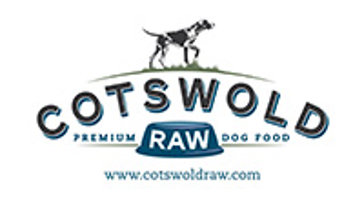From top training results to temperament, a dog's behaviour is influenced by more than just breed and environment, but nutrition too.
SoGlos speaks to pet nutrition experts, Cotswold RAW, to explore the science behind the gut to brain connection, the role raw diets play in supporting cognitive health, from puppyhood to old age, and why bonding through food can strengthen human to dog relationships.
Bonding and behaviour go hand-in-hand. Why is it important to build a bond with your dog?
Building a bond with your dog is more than just spending time together — it’s what transforms them from a pet into a true companion.
This bond lays the foundation for trust, where your
dog feels safe and understood. It’s easy to forget our dogs don’t understand
English, well, apart from the select few words such as 'treats!' They interpret
us through our body language and tone.
Better training results are
also achieved when there's a solid bond in place. A well-bonded dog is more
eager to please, more cooperative and far more engaged. Ultimately, it’s not
just about obedience or control — it’s about building a relationship rooted in
connection, trust and loyalty.
The brain and gut are closely connected. How does a raw, species-appropriate diet help encourage good behaviour?
The gut and brain are in constant communication through neurotransmitters and this connection plays a major role in your dog’s mood, energy and behaviour.
Around 90 per cent of serotonin
is produced in the gut, so when gut health is compromised, behavioural changes can
follow. Diet plays a key role in shaping the gut microbiome and an imbalanced
microbiome can lead to chronic inflammation and disrupted neurotransmitter
function.
Raw feeding can support better digestive health which, as discussed, supports the brain. Raw protein and fat are more digestible than cooked alternatives, making them easier on the gut.
Dogs fed a raw diet have been found to have higher GABA levels – a calming neurotransmitter – compared to those on a dry diet.
Additionally, previous research has shown that after switching from dry food to a complete raw diet, 98 per cent of owners reported significant behavioural improvements in their dogs.
How does diet support cognitive health, from puppyhood to the golden years?
Omega-3 fatty acids, especially EPA and DHA, play a vital role in brain health and behaviour.
Research shows that puppies whose mothers received EPA and DHA during pregnancy
and lactation had better learning and memory.
These essential fats support
neurological development, boosting trainability in puppies and cognitive
function in senior dogs. Raw diets provide EPA and DHA primarily through offal.
Other excellent sources of these omega-3 fatty acids are small oily fish and
salmon oil.
Food can be an important aspect of bonding with your dog. What different treats can be offered to keep a dog happy?
Training treats are perfect for rewarding good behaviour
and reinforcing positive habits.
Chewing is a natural and calming behaviour that
releases feel-good endorphins like dopamine. Whether in the form of a raw meaty
bone or an air-dried snack, chews are great for enrichment, stress relief and
a tasty snack all in one!
With colder weather incoming, soup season is
on the horizon. Bone broth is a nourishing and easily digestible treat that's ideal
after chilly walks. Packed with protein, minerals and nutrients, it helps soothe
the gut and promotes healthy joints. Serve it warm, mix it into meals or
freeze into cubes for a refreshing snack.
Some dogs are hyper, whilst others are laid-back. How can a raw diet support a more balanced temperament?
What your dog eats directly affects their energy levels, mood and behaviour.
Diets high in refined carbohydrates provide a burst of instant energy, often followed by a crash – which can lead to erratic behaviour and energy slumps. Instead, opting for a high-protein diet helps keep dogs fuller for longer and provides sustained energy release.
If including carbohydrates in the diet, choose a small amount of complex, carbohydrates, as these release energy slowly and support gut health with fibre-rich prebiotics. It’s also important not to overlook vitamins — B6 is essential for producing serotonin and melatonin, while other B vitamins help with its absorption.
A well-balanced diet rich in these nutrients can make a real difference in your dog’s mood and mental wellbeing.
How do you hope Cotswold RAW contributes to the bigger picture of happier, healthier human and dog relationships?
At Cotswold RAW, we’re passionate about creating high-quality, biologically appropriate raw food for dogs.
Good behaviour starts in the gut, meaning the right diet plays a key role in your dog’s health, mood and overall wellbeing.
Diet composition, gut health and even ingredient quality can affect behaviour, so we make sure that your dog is fuelled by the very best!






















.jpg?width=432&height=227&rmode=pad&bgcolor=ffffff&quality=85)